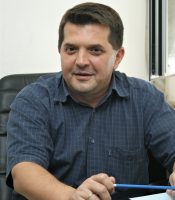Branković, dr med. Đorđe
Dr Đorđe Branković rođen je 1965. godine u Tuzli, gde je završio osnovnu
školu i gimnaziju i započeo studije medicine. Zbog ratnih dejstava na teritoriji bivše
SR BiH, studije je nastavio na Medicinskom fakultetu Univerziteta u Beogradu, na
kojem je i diplomirao.
Pripravnički staž obavio je u DZ „Vračar“ i u KBC „Zvezdara“, posle čega je
radio u Zavodu za hitnu medicinsku pomoć u Beogradu. Za vreme specijalizacije
Fizikalne medicine i rehabilitacije volontirao je u Institutu za rehabilitaciju
Sokobanjska 13 Beograd i u Kliničkom centru Srbije. U periodu 1998–1999, na
teritoriji KIM, bio je angažovan na poslovima sanitetskog obezbeđenja Posebnih
jedinica MUP-a Srbije. Po završetku agresije na SRJ, angažovan je u Republičkom
zavodu za medicinu sporta.
U Kompaniji „Dunav osiguranje“ zaposlen je od februara 2004. godine, gde u
Direkciji za osiguranje lica učestvuje u kreiranju, sprovođenju i razvoju prvih oblika
zdravstvenog osiguranja, širenju mreže zdravstvenih ustanova s kojima Kompanija
sarađuje kroz sistem privatnog dopunskog zdravstvenog osiguranja (Kompanija
„Dunav osiguranje“ prva je na tržištu osiguranja Republike Srbije ponudila uslugu
dopunskog zdravstvenog osiguranja). Pored navedenog, u istoj direkciji angažovan
je na poslovima razvoja i sprovođenja osiguranja lica za slučaj bolesti i hirurških
intervencija, osiguranja života i osiguranja od nezgode. Učestvovao je i u izradi prvih
Uslova i procedura za sprovođenje putničkog zdravstvenog osiguranja u Kompanije i
utemelјio principe na kojima to osiguranje u Kompaniji funkcioniše.
Posle preimenovanja Direkcije za osiguranje lica u Direkciju za životna
osiguranja, angažovan je na poslovima razvoja osiguranja života i na poslovima
procene zdravstvenog rizika kod lica koja zaklјučuju osiguranje života (underwriting),
a bavi se stručno, medicinskom procenom u osiguranju od nezgode. Autor je više
stručnih radova i predavanja iz oblasti zdravstvenog osiguranja, osiguranja lica i
medicine osiguranja.
Trenutno radi u Sektoru za naknadu šteta životnih i zdravstvenih osiguranja u
Direkciji za naknadu šteta Kompanije „Dunav osiguranje“.

SUPPLEMENTARY HEALTH INSURANCE
With right conditions provided, citizens would choose to be
treated in private sector on a larger-scale which, as a consequence, would considerably relieve the public fund and,
at the same time, enable the opening of new positions for
young doctors and those doctors which became a „surplus”
in public institutions. Inclusion of village health stations
into the voluntary health insurance system would motivate medical staff to seek jobs therein and thus a high-quality health care would be provided in the environments in
which it has been lacking so far. The aforementioned is in
the general public interest meaning that it is expected to be
met with a positive response of both the Ministry of Health
and the Republic Institute for Health Insurance, primarily
through the support to insurance companies.
Having in mind the aforesaid, the new Law on Health
Insurance opens a series of possibilities for improvement of
health care system in general.

MEDICINE AND INSURANCE
In the insurance industry medical examiners are involved
in the operations of a large number of organizational units
where they perform duties related to various lines of insurance, accidents, illnesses, surgical procedures, non-material loss, representation in court and passenger insurance.
In consideration of the fact that the criteria for the evaluation of physical damage, disability and non-material loss
are not of an exact but of an orientationalcharacter, the differences in evaluation derive from the very object of expertise. This poses a problem in cases where a person has several accident policies with major insurers and where there
are discrepancies between assessments of the same insured
eventcarried out by several medical examiners. These differences are minimal where a medical examinerconscientiously performs his duties, but they may be potentially disadvantageous to sale and marketing. Incomplete doctor’s reports render the assessment of the accident consequences
more difficult, for which reason additional documents are
required and the claim settlement procedure is prolonged,
or decisions are made on the basis of enclosed documents
and the assessor’s personal experience.
Before the stipulation of a life insurance contract, doctors assessthe health-related eligibility of the applicant. Huge
sumsinsured and unfavourable risk spread in certain cases of
special-purpose life coverages impose particular responsibility and urge medical examiners to use extra caution.
In view of the moral hazard and prevention ofloss, amedical examiner needsto have a critical attitude asregards health
details provided by the applicant and reports made by doctors. When the insured event occurs, the problem regarding
the procuring and concealing of medical documents may
arise and hinder the disclosure of undisclosed circumstances.

